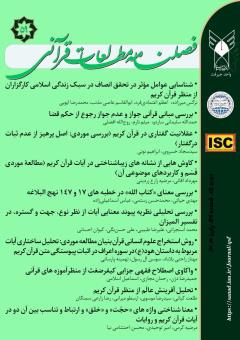واکاوی اصطلاح فقهی جزایی کیفرضغث از منظرآموزه های قرآنی
محورهای موضوعی : فصلنامه مطالعات قرآنی
حمیدرضا دژن
1
*
![]() ,
رحمان مجازی
2
,
رحمان مجازی
2
![]() ,
اسماعیل اسلامی
3
,
اسماعیل اسلامی
3
1 - دکتری حقوق جزا و جرم شناسی، واحد رفسنجان، دانشگاه آزاد اسلامی، رفسنجان، ایران
2 - دکتری گروه حقوق خصوصی ،واحد قشم ،دانشگاه آزاد اسلامی ، قشم،ایران
3 - عضو هیئت علمی و استادیار گروه حقوق
کلید واژه: ضغث , قرآن, فقه جزایی, شلاق,
چکیده مقاله :
کیفر ضغث یکی از مسائلی است که در حقوق اسلامی و فقه جزائی مورد توجه ویژه واقع شده است. این مسئله در اسلام دارای اهمیت بسیار زیادی بوده و براساس آموزههای قرآنی و فقهی شکل گرفته است. در این پژوهش اصطلاح فقهی کیفرضغث در راستای بهبود نظام قانونی برمبنای ادله نقلی و اصول تعیین کننده جدید و مقررات این کیفرمورد بررسی و ارزیابی قرارمیگیرند. این اصول به عنوان مبناهای اصلی در تنظیم قوانین جزائی در خصوص کیفر ضغث مورد استفاده قرار میگیرند. همچنین، اصول قرآنی مرتبط با اعمال حدود و یمین نیز مورد بررسی قرار میگیرند. با بهرهگیری از منابع فقهی و قرآنی مربوط به مسئله ضغث، پژوهش حاضر به اهمیت رعایت اصول فقهی در تنظیم قوانین جزائی و اصول قرآنی دراعمال حدود ویمین تأکید میکند.نتایج نشان میدهند که اصول فقهی میتوانند بهبود نظام حقوقی درخصوص کیفرضغث را ترویج کنند و از جمله تأثیرگذارترین اصول در این زمینه، تعقل و توجه به مصلحتهای فردی و شخصی وعمومی هستند در نهایت، پژوهش حاکی از اهمیت تأثیراصول فقهی و قرآنی درتنظیم کیفر ضغث است و پیشنهاد میدهد که نظام حقوقی با رعایت این اصول بهبود یابد.
Punishment for wrongdoing is one of the issues that has received special attention in Islamic law and criminal jurisprudence. This issue is of great importance in Islam and is formed based on Quranic and jurisprudential teachings. In this research, the jurisprudential term of kifarzghath is examined and evaluated in order to improve the legal system based on narrative evidence and new determining principles and regulations of this criminal case. These principles are used as the main bases in the regulation of criminal laws regarding the punishment of violence. Also, the Quranic principles related to Hudud and Yamin practices are also examined. By using jurisprudence and Quranic sources related to the issue of Daghath, the present research emphasizes the importance of observing the principles of jurisprudence in the regulation of criminal laws and Quranic principles in the acts of Hudud Vimin. The most influential principles in this field are rationality and attention to individual, personal and public interests. Finally, the research indicates the importance of the influence of jurisprudence and Qur'anic principles in regulating the punishment of ghast and suggests that the legal system be improved by observing these principles.

